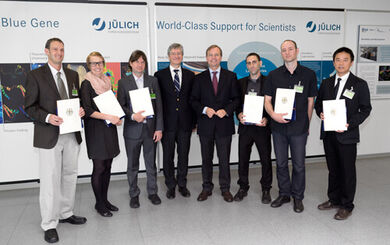Müller lab (2009 - 2018)

Research focus of the Müller lab while in Heidelberg
Among the various strategies proposed for antimalarial vaccination, live-attenuated Plasmodium parasites remain the gold standard because they confer long-lasting protection against natural malaria transmission (1); protective immunity elicited by RAS is multi-factorial, involving interferon-g (IFN-g) producing CD8+ and CD4+ T cells and neutralising antibodies. Attenuation of sporozoites by irradiation likely induces multiple random mutations in the sporozoite genome that ultimately lead to a block in liver-stage (LS) development.
Therefore, immunised individuals harbour a heterogeneous population of attenuated yet genetically undefined sporozoites which are likely to develop to different extents, to express different combinations of LS- and early erythrocytic stage antigens and to elicit different immune responses. In addition, if under-irradiated or over-irradiated, these sporozoites fail to induce complete sterile protection (2). Despite recent efforts to scale up the production for larger clinical trials (1), it is unlikely that a vaccine based on radiation-attenuated sporozoites (RAS) will be licensed for wide-scale use in humans. Nevertheless, RAS have proved to be an invaluable tool to dissect the immune mechanisms that result in protection against natural malaria transmission (3) and the challenge now is to use what we have learned from RAS to develop a new generation of attenuated or subunit vaccines.
A major area of interest in the laboratory was the characterisation of protective immune responses to malaria induced by genetically attenuated parasites (GAP) and to compare these responses to those induced by RAS and wild-type (WT) sporozoites. In a separate study, the lab generated and characterised genetically attenuated uis3 (-) and uis4 (-) parasites (GAP) that constitute a reproducible and standardised source of potent live-attenuated parasites. The group combined their molecular and cell biological research on GAP with studies aimed at understanding the immunological correlates of protection elicited by GAP.
In strong collaborations with labs experienced in malaria immunology and cell biology, the lab worked on the characterisation of effector and memory responses following immunisation with GAP and further on the identification of mechanisms involved in sterilising protection. They found that immunisation with GAP does not cause breakthrough infection in T and B-cell-deficient mice. Intriguingly, protection was abolished in these animals, suggesting a crucial role for adaptive immune responses and interferon-gamma. These GAPs provide us with a new tool to further understand the immunology of malaria liver stages in much more detail.
Additionally, the lab dealt with the characterisation of the kinetics, phenotype and function of induced CD4+ and CD8+ T cell responses upon immunisation with GAP. First data raised the intriguing possibility that immunisation with GAP induces a differential re-programming of T cells.
As part of the SPP 1580: Malaria intrahepatic interactions and trafficking: Deciphering the molecular machinery driving vesicular trafficking and membrane fusion between the hepatic host environment and malarial parasite for parasitophorous vacular membrane dynamics
The intracellular development and differentiation of the Plasmodium parasite in the host liver is a prerequisite for the actual onset of malaria disease pathology. Since liver stages are clinically silent and can be completely eliminated by sterilising immune responses, they are promising targets for urgently needed innovative antimalarial drugs and/or vaccines. Discovered almost more than 60 years ago, these stages remain poorly understood regarding their molecular repertoire and interaction with their host cells in comparison to the better accessible pathogenic erythrocytic stages. The overall aim of this herein proposed project is to broaden the knowledge of the fundamental dynamic cellular processes of the intrahepatic malarial parasite with both specific host-cell factors and compartments. The differentiating and replicative intrahepatic parasite resides in a membranous compartment called parasitophorous vacuole, separating it from the host-cell cytoplasm in addition to its own plasma membrane. In the course of our proposed studies we aim at focussing on the functional characterisation of specific proteins known to reside in the parasitophorous vacular membrane (PVM) where they are suggested to recruit crucial energy sources from the host compartment to ensure survival and expansion intrahepatically. In a parallel approach we hope to be able to interconnect the role of those PVM-resident proteins to family members of the parasitic vesicular trafficking network localising to the parasitophorous vacular compartment and potentially across the PVM to other compartments of the hepatic environment. The results of this study can be exploited for the development of new approaches to prevent both malaria disease and infection. It will ultimately improve our understanding of different cell-biological aspects of host/pathogen interactions.
A selection of activities while in Heidelberg
ARCHES Prize 2012

The German-Israeli research tandem Ann-Kristin Müller and Ron Dzikowski (Hebrew University of Jerusalem) won the 200,000 € Award for Research Cooperation and High Excellence in Science (ARCHES) in 2012. This award for research cooperation between the 2 countries was founded in 2008 and has been funded by the Federal German Ministry for Education and Research (BMBF) and administered by Minerva.
Participation in Management Programme
"Towards a Professorship"
Developed as part of the Excellence Initiative in 2009, the management programme “Towards a Professorship” prepares researchers to take on responsibilities in leadership and management, it provides support for their personal career planning and it helps them to develop an interdisciplinary network.
Ann-Kristin successfully participated in all 3 modules.

